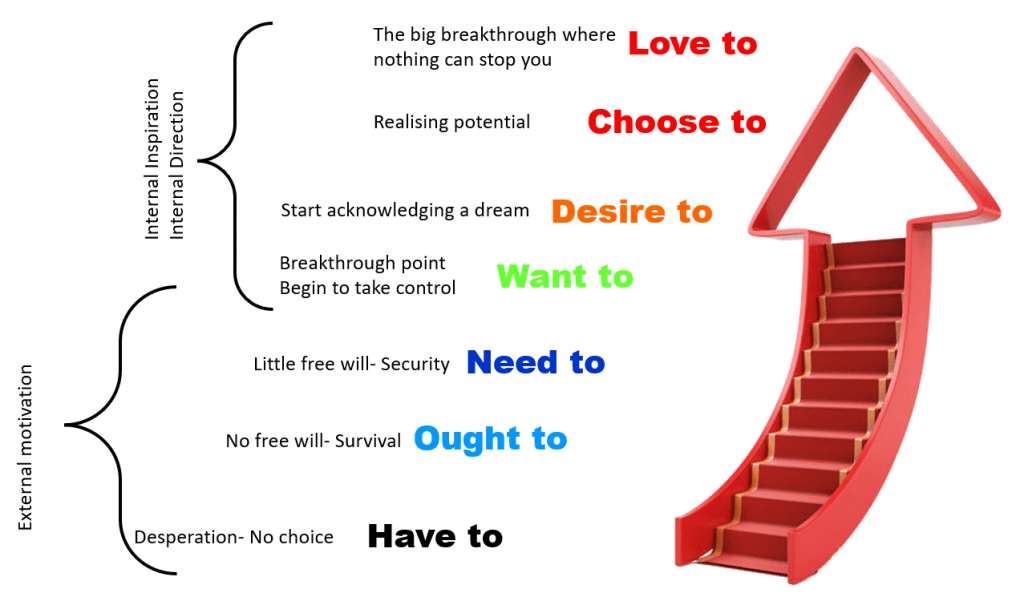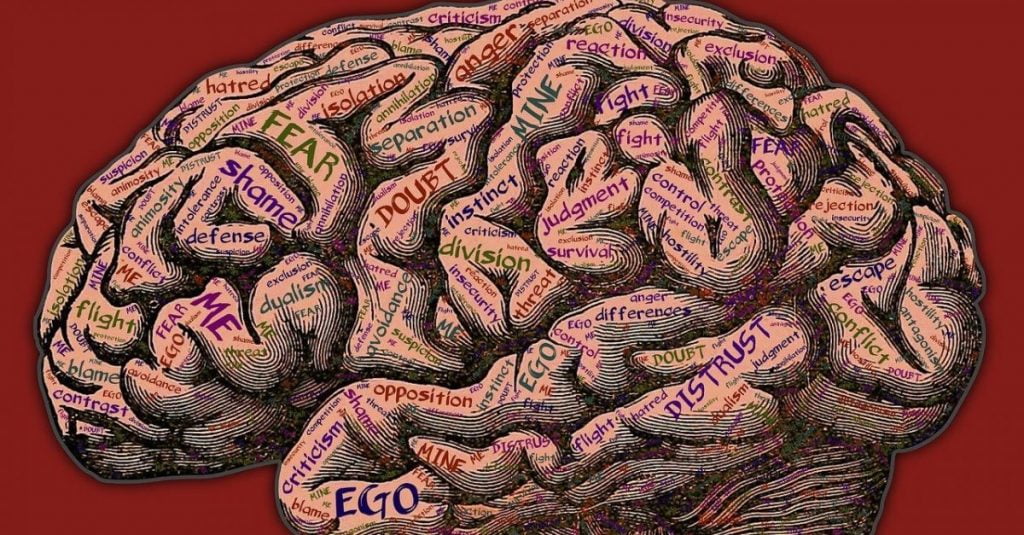Are you unhappy with the direction your life is taking? Are you able to change the things that make you unhappy, or are you stuck? Is your potential limited, like your ability to take control of your life?
If the answer to any of these questions is ‘Yes’, then using motivating self-talk and powerful, positive language can transform your thoughts and your life.
How we communicate with ourselves influences our thoughts, emotions and feelings. If your internal voice is critical and disempowers you, you will likely feel lousy about your life. But, by using the right words, you can change your mood and begin to fulfil your potential.
Evaluating how you feel about your life
Before examining your internal dialogue, first, complete this simple activity.
On a sheet of paper, write down five tasks you have to do in your personal and work life. These can be one-off tasks or tasks that you do regularly. e.g. pay the mortgage.
- What words/images/feelings come to mind when you look down your list? Do you enjoy the tasks, or are they a bit of a chore?
- How does each item on the list make you feel? Rate each item on a scale of 1 -10 (with 10 being very inspired and motivated to complete the task).
- Have you put off any of these tasks? If so, for how long?
Powerful, Positive Language and a Victim Mentality
How we communicate with ourselves determines how we feel about ourselves and our lives.
If you see yourself as someone who has little control over what happens in your life, you are a victim of your circumstances. And so, it is your mindset.
People who walk around with a victim mindset accept their life for how it is. They believe that society has been set up for the benefit of others and not for themselves. When something bad happens, people with a victim mindset tend to blame others and their surroundings.
In the end, It limits their potential. They believe if they attempt anything new, it will only end in disaster. And all because they don’t believe in their own power to make a difference.
As a result, life happens to them. They don’t decide what happens, even in their own life. Ultimately, they have given away their ownership of their own lives to whatever happens that day. If it rains, it’s going to be a bad day.
Studies have shown that when we feel we have no control over our lives, we become depressed. This can further ingrain the negative thoughts we have about ourselves and our lives.
Some people even become emotionally addicted to this feeling: their lack of control and the victim mentality. It essentially becomes their personality. Consequently, any change can damage a person’s sense of self. It’s how they understand themselves, and they cannot see past it. Furthermore, they get recognition from others about who they are, which further embeds the belief.
When we believe we have no agency over our lives, we are less likely to make changes (even minor ones). Our lives become static and unchangeable. And when things do change, it is due to our environment and not because we decided on any action.
Victim or Owner
However, we can choose to be the victims or the owners of our lives. Victims are victims of their circumstances. With this mindset, the weather, a missed bus or even a broken pen can decide the entire day. On the other hand, owners own their circumstances and see available choices.
This simple process to change your thoughts can begin by exploring the language you use when talking to yourself. A small language change will allow you to see just how much control you have over your life. And when you realise what you can control, you can start to make changes.
This simple exercise can transform your thoughts. As you go higher up this ladder, you take greater control of your life. The bottom level is the place of victimhood and being controlled by outside forces. There is little personal growth, and life will likely lack meaning and passion.
As you reach the higher levels, your motivation will come from inside. Life will have purpose, passion and growth. Using powerful, positive language and motivating self-talk will help you realise your power to modify your life.
You can transform everything you have learnt about life, your agency to make a difference and your potential to follow your dreams. It is possible to rediscover your lost passion, and it all begins with realising the choices you have every single day.
As you read through the following, please stick with it till the end. Your key takeaway might not come until the end.

Have to
This is the lowest level and the level of victimhood. From here, we tend to see life as happening to us. Everything we do is because we are obligated. From here, we become stuck and not motivated. There is no powerful, positive language.
I have to go to work. I have to pay the rent. I have to visit my parents. I have to lose weight.
If it’s something you have to do, you are unlikely to enjoy it. It’s unlikely to be inspiring, and it’s likely something that you haven’t chosen.
A few years ago, I ran a weekly meditation workshop at my school because I was concerned about the well-being of the staff. If the headteacher had forced me to run that same weekly workshop, I would have been less passionate about running it- even with a financial incentive.
When we use ‘have to’, we are victims of our environment. If the boss wants us to do something, we will follow his order, but we feel miserable about it at the same time. We won’t make changes because we don’t believe in our own power. We do things because we might feel forced into doing them.
A good question to ask yourself is, ‘is it true?’ Is it true that you have to lose weight? Using the words ‘have to’ suggests that someone has coerced you into losing weight as though there is no alternative. But is this true? In truth, you don’t have to do anything. You just don’t like the consequences of not following through with these things.
A slight shift in language to ‘ought to’ can start to empower you and change your mindset.
Ought to
Ought to might seem only a semantic change, but it’s a step that begins to give us some ownership of our life. It can help us understand why we do the things we might dislike.
When you say you have to pay the mortgage, you subconsciously declare that someone is forcing you. It’s as though the government or some external body has made it mandatory. By making this small change, you realise that no one but you.
You ought to pay your mortgage because you want somewhere to live. You ought to take your children to school so that you don’t get into trouble.
This small change makes us less of a victim, but we still get our motivation from what happens externally from ourselves. Other people may still direct our actions, but they don’t force us. We only fear the consequences of not following through with what someone asks.
I ought to go to work because otherwise, I would lose my job.
We can further empower ourselves by taking one more step up, from ‘ought to’ to ‘need to’.
Need to
When we use the language of ‘need to’, we place less external pressure on ourselves. It is a small reframe when using the language of ‘need to’ from ‘ought to’. At the ‘need to’ level, we at least fulfil one of our basic needs. It could be a need for companionship, food, love or something else. You need to go to work because you need to feed yourself to survive.
This level is more empowering than the levels below. Although at this level, we are still victims of our circumstances. Yet, we get some justification for why we live our lives in ways that might make us unhappy. It can also help us identify the areas of life that do not fulfil our needs.
The next step is the breakthrough point. At the next level, the motivation starts to come from within, and we begin to use more powerful, positive language.
Want to
When we use want, we take greater ownership of our lives and are less likely to have other people put their demands on us.
I want to live in a beautiful house, so I have to pay the mortgage and work to make money. This change can empower and lead us to take more ownership of our lives. As a result, we might be more able to say ‘No’ to people who ask us to do things we don’t want to do.
The problem with this level is that our wants tend to be decided by what we see externally. Advertising and the world around us create our wants. You may want the latest iPhone because you have seen the advert. Maybe you want a faster car because a neighbour recently upgraded theirs.
There is empowerment when we use the language of want, but another step up can move us further towards greater control. The next level is a desire to.
Desire to
Desires are different from wants. A desire is more internally motivated by who we are and our values. Desires have a higher purpose than just acquiring things. We have motivation from within us at this level, and we are no longer victims of our circumstances or envy.
Let’s re-examine the belief that you have to take your children to school. By rewording the action and evaluating your values about what’s important, you may instead say you desire your children had a successful life and happy childhood. Instead of seeing the chore of taking our children to school because you are obliged, it is an action that we desire because it fulfils some of our deeper values.
You might desire security. You can achieve security by having a career that pays well and a home that affords you a place to call your own.
This change moves us further towards self-empowerment. To a place where we follow our own deeper desires because they match our values.
The next step is where true empowerment comes: ‘choose to’.
Choose to
‘Choose to’ is where you begin to realise your potential and make changes to create the life you want. We all have a choice, no matter what it is. No one can force you to do anything that you don’t want to do. It is the first actual level of powerful, positive language.
There is power in choice.
Your manager cannot force you to work, the bank cannot force you to pay your mortgage, and your parents cannot force you to listen to their stories.
You choose to do these things. Sure, you won’t like the consequences if you don’t pay your mortgage, i.e. losing your home. However, if you see that it is a choice, your feelings about making payments can seem more empowering. You are choosing to make payments because you have agency in your life.
And if you don’t like that choice, you will do something about it, because it is a choice.
The choices you make that take account of your values and desires will make you happier. At this level, you are entirely self-directed and empowered. If you feel empowered, you will begin to make choices that impact your life positively.
You won’t wait for life to happen to you. Instead, realise that you own the power within your life.
But this isn’t the ultimate level. There is one more. That is the level of love.
Love
If you realise that you have a choice in your life, then find a way to love it. By choosing to love your actions, you will feel better about yourself and start to make more positive changes. This is the highest level of powerful, positive language.
When you feel stuck, begin at the bottom and work your way through the levels until you realise the choice you have made. When you can see that you own your life, choose to love your choices.
You can find the aspects of anything that you love. Maybe at the moment, your job makes you miserable, but how about all the elements: your colleagues, your workspace, the time to listen to music on the journey in, or the coffee shop in the morning.
Just finding what you love about your choices will make you feel better.
If you can’t find things to love, looking at your life from a new perspective will help.
Personal History
Before I discovered this language reframe, I put off many things.
Recently, I had to call up my internet provider to change my service as my contract had expired. After putting it off for a few days, I started a reframe with myself. I first looked at it from the level of desire, and one of my values is not paying more for something than I should. From this level, I could see that I had a choice to follow through with my values or continue with paying a much higher price. When I chose to call my ISP, I loved that I had got round to saving money.
Using this in your life
The more you use powerful, positive language in your life, the more natural it will seem. Sometimes it might seem like a leap from one level to another, and you will gradually need to travel from the bottom to the top. At other times, it’s easy to jump straight to the top. Go through the process in whatever feels natural and possible for you.
Now, reflect on the list you wrote earlier and see how you can transform your thoughts and feelings around them.
If you would like to talk this through with someone or have coaching, reach out and send me a message.





